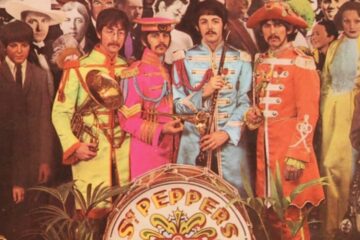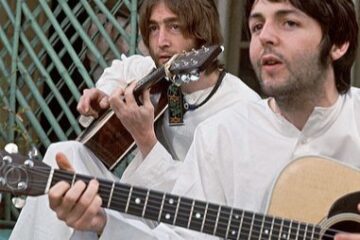Music The story behind Jimmy Page’s 10 greatest guitar parts
The entire essence of rock and roll music stems from the guitar riff. For all of the great musical moments coming from the drums or the odd vocal run, it doesn’t get any more perfect than turning up a loud guitar and hearing the sound of it radiate around the room for the first time. Even though Keith Richards and George Harrison may have been on the verge of the guitar riff throughout the 1960s, it took Jimmy Page to turn it into high art.
Coming from the blues tradition, Page was able to twist a handful of notes and create some of the most celebrated musical pieces of his generation. Whether it was on a loud guitar or dominating the acoustic guitar field, Page was known for pulling off any kind of precise run that he could think of, albeit while being slightly in front of the beat.
Even though Page started as a session guitarist, his time with Led Zeppelin changed how rock and roll was perceived, taking the basis of blues and putting a touch of darkness into the mix. Across every album, Page would be on the verge of hard rock and heavy metal every step of the way, often creating different trends or defying the usual vocabulary for the guitar whenever he could.
Compared to the other guitar gods to come out of the 1970s rock scene, Page’s tone has turned his guitar into an extension of his personality, being as inherent a part of him as his ear for production. From the most celebrated moments of Zeppelin’s career to a handful of lowlights from his career, this is a small sample of how Page used his guitar to bend the music world to his will.
Jimmy Page’s most iconic guitar moments:
‘Heart Full of Soul’ – The Yardbirds
Jimmy Page didn’t become one of the greatest guitarists of his generation by happenstance. Before he got his start in Led Zeppelin, Page was known as one of the most prolific session musicians before getting the call to join blues troubadours The Yardbirds in place of fellow guitar legend Eric Clapton. Arriving at the dawn of psychedelic rock, Page made his presence known from the first notes he played on ‘Heart Full of Soul’.
Compared to the other distorted guitar parts coming out at the same time, Page’s distorted tone sounds like it’s drowned in fuzz, practically overloading the channel as he bends the strings to create a disorienting feeling. Even though Page was known to play to the song’s strengths at every opportunity, this is one of the first times fans got to hear a taste of the wild animal hiding underneath the small exterior.
‘Dazed and Confused’ – Led Zeppelin I
Quickly outgrowing the sounds of the Yardbirds, Page had the idea of forming the essence of a supergroup with Led Zeppelin. Taking the name from a back-handed compliment from The Who’s Keith Moon, Page would bring Robert Plant and John Bonham into the fold alongside session player John Paul Jones to create musical magic on their debut. Although the band would take various songs from their old repertoire for their debut, ‘Dazed and Confused’ was transformed when Page got his hands on it.
Initially performed by Jake Holmes when touring with The Yardbirds, Page turns the signature descending into one of the heaviest pieces of music to come out of the late 1960s, incorporating the same bending techniques he used on ‘Heart Full of Soul’. Once the band performed live, though, Page would turn the song inside out, from using a theremin to match his guitar playing to introducing the violin bow into the equation, punishing his strings throughout every performance. This was the start of a new guard in rock and roll, but Page was only just getting started.
‘Whole Lotta Love’ – Led Zeppelin II
If Led Zeppelin I was the band honing their strengths, Led Zeppelin II is where they start to go beyond the standard blues vocabulary. While songs like ‘The Lemon Song’ and ‘Bring It On Home’ were focused on the same covers the band had learned night after night, Page was looking to create a different tone with his guitar no one had heard before. Armed with the basis of the song ‘You Need Love’ by Willie Dixon, Page introduced the world to what the 1970s would sound like on ‘Whole Lotta Love’.
Although many artists may have tried their hand at playing the song correctly over the years, Page employed an unorthodox approach to the main riff. Instead of sliding into the central figure, Page would bend the strings and play the open D string, creating a natural ambience that makes the riff sound slightly dissonant. Capping the song off with one of the most savage guitar solos he had laid down until that point, Page had started to develop his language on the instrument and was only becoming more fluent with age.
‘Since I’ve Been Loving You’ – Led Zeppelin III
When talking about Zeppelin’s most significant moments, it usually comes to their fantastic way of interpreting other’s works. For all of the great original compositions they had under their belt, Page was known for transforming traditional blues into an emotional exorcism, practically letting any emotion he could on the fretboard when he took to the stage. Although most of Zeppelin’s best work remained on the live stage, ‘Since I’ve Been Loving You’ captured a magical moment when they entered the studio.
In the middle of the folk-tinged sounds of Led Zeppelin III, the solo of this song features some of the most tasteful playing that Page ever made, building from a slow emotional track before coming to an emotional crescendo towards the end of the track. Although many Zeppelin tracks could take listeners to another world, Robert Plant even admitted to feeling spiritually lifted the minute the band played the tune in a live setting.
‘Stairway to Heaven’ – Led Zeppelin IV
‘Stairway to Heaven’ may be one of the few classic rock anthems that earned every bit of its reputation. While many songs suffer from being overplayed into the ground, every piece of this celestial epic remains one of the greatest peaks in rock music. Although Page admitted that the song was one of the highlights of his career, the tune’s genesis started as a failure at making a classical composition.
Based on Bach’s ‘Bouree in E Minor’, Page transposed the key and tried to add his unique flavour to the track before coming up with the classic opening guitar lick. Pairing together different musical ideas, Page practically takes the listener on a journey throughout the song, culminating in the massive solo recorded on the spot on a Fender Telecaster. While Zeppelin would see even greater heights commercially after ‘Stairway to Heaven’, this song was where every piece of the band’s sound crystallised into musical perfection.
‘The Rain Song’ – Houses of the Holy
After four self-titled albums, Houses of the Holy was the moment Zeppelin decidedly to branch out even further. While Led Zeppelin IV had a smorgasbord of every single aspect of the band’s sound, songs like ‘The Crunge’ and ‘No Quarter’ broadened the playing field for where the band could go, inadvertently birthing the sounds of heavy metal without really trying. When George Harrison commented that the band had no ballads, Page unpacked his acoustic and went to town.
Based on an open tuning that Page invented, ‘The Rain Song’ is the most ethereal track he ever laid down. Taking the basis of different chords that he made up in the new tuning, the track demonstrates Page’s ability to change the mood of the song on a dime, from the majestic interplay between him and Jones’s Mellotron to making the demented guitar riff in the song’s midsection that sounds like it’s pulled from the underworld. Houses of the Holy may be considered a stop-gap between two Zeppelin classics, but ‘The Rain Son’ is still one of the most emotionally frail Zeppelin moments ever.
‘Kashmir’ – Physical Graffiti
Every piece of Zeppelin’s career was about building momentum towards something more significant. Whether it was taking the blues in a different direction or trying out a completely different genre, nothing was off the table if it meant the band could push their genre forward. After embracing the sounds of world music, Page combined the sounds of hard rock, classical, and Eastern styles into one on ‘Kashmir’.
Performed in the ethereal DADGAD guitar tuning, Page came up with the classical string parts on his guitar, making for a strange mix of musical modes that cascade in on each other. As opposed to the previous uses of classical music with rock, the band sounds like an orchestra on their own alongside Plant’s vocals, singing about voyaging into new lands and letting the sun beat down upon his face. Page had already made a name for himself in England and beyond, but this was the sound of him expanding his horizons into global territory.
‘Ten Years Gone’ – Physical Graffiti
Not every Zeppelin song was meant to fall back on the blues. While the sounds of Willie Dixon and Howlin’ Wolf may have been where the band started, the whole point of starting the band was for Page to try out different styles that didn’t usually fit in the mould of songs about a woman doing him wrong. Though ‘Ten Years Gone’ may have been a similar approach to heartbreak, it involved some of Page’s most tasteful use of chords that he ever made.
Instead of relying on the traditional cowboy chords or even the booming power chords, Page weaves together different dissonant chords to form a beautiful musical passage before Plant’s vocals come in. Using the uncommon drop D tuning rising to prominence at the time, Page created chords that were unheard of at the time, creating a piece of music that was far more musical than what he could have played on a standard tuned guitar. Page may have a reputation for being the wild man behind the fretboard, but when he calms down on songs like this, fans get a peek into the sensitive side of his playing.
‘Achilles Last Stand’ – Presence
Compared to the rest of Zeppelin’s catalogue, Presence tends to get a bit lost in the shuffle. Since the band were dealing with their fair share of problems and Plant having to record different pieces of the album from a wheelchair after a car accident, many of the songs tend to feel half-finished or the makings of a great song. Although the epic period of Zeppelin was on the verge of collapse, they left their time on a massive high note on the song ‘Achilles Last Stand’.
Rather than the traditional approach to his driving riffs, Page’s licks on the ten-minute epic is a perfect exercise in minimalism, playing booming chords while Jones hunkers the band down to the ground with his relentless bass playing. Even though Page could have easily tried incorporating little licks into every piece of this song, those massive chords are practically the sounds of a guitar god staking his claim as one of the greatest in his field.
‘All My Love’ – In Through the Out Door
By the time Zeppelin got to In Through the Out Door, they were about to come crashing back to Earth. As the band prepared to go out on tour, John Bonham would be found dead at Page’s house after a night of heavy drinking. While the band may have unintentionally recorded their swan song, ‘All My Love’ was one of the most sombre moments that Page ever contributed to.
Written in tribute to Plant’s son, who had passed away a few years earlier, Page approaches the guitar in a completely different manner on this tune. As opposed to the booming chords, Page takes a back seat to Jones’s keyboards, only putting the occasional lift in the track until the song’s midsection. As the song breaks down, Page adds his last piece of brilliance with his signature bends, making it sound like it’s crying out in pain. Although Page didn’t think of the song that fondly in the years since ‘All My Love’ is a masterclass in how to say a lot with only a few notes.




